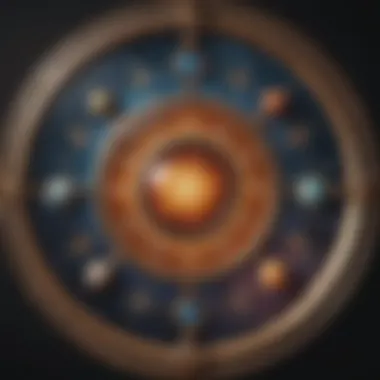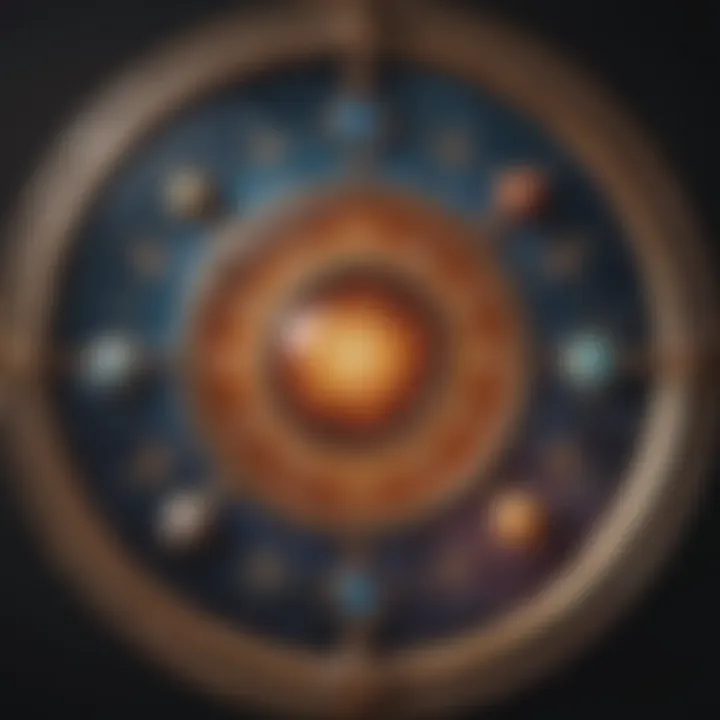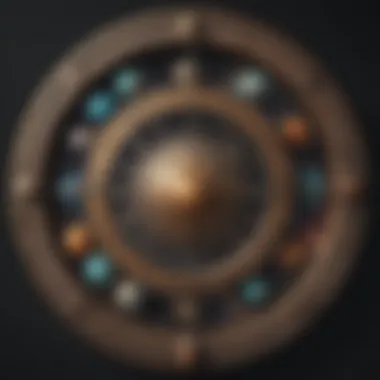Unlocking Your Future: Complete Horoscope Insights


Intro
Horoscopes have long fascinated humanity. They offer a framework through which individuals can explore their identities and understand their experiences. This article aims to provide a detailed examination of how using your date of birth to create a complete horoscope can unlock profound insights into your life. The connection between celestial movements and human experiences has intrigued many. Astrological interpretations focus on the specific alignments of planets and their implications.
Through the lens of astrology, people can gain personal insights and make informed decisions in life. This guide will walk you through the structure of horoscopes, emphasizing how zodiac profiles, compatibility insights, and astrological events are pivotal in practical astrology. Readers will learn how to harness these celestial influences for personal growth.
Zodiac Profiles
Overview of Each Sign
Astrology divides the year into twelve distinct zodiac signs. Each sign corresponds to specific dates, attributed characteristics, and astrological elements. Here is a brief overview:
- Aries (March 21 - April 19)
- Taurus (April 20 - May 20)
- Gemini (May 21 - June 20)
- Cancer (June 21 - July 22)
- Leo (July 23 - August 22)
- Virgo (August 23 - September 22)
- Libra (September 23 - October 22)
- Scorpio (October 23 - November 21)
- Sagittarius (November 22 - December 21)
- Capricorn (December 22 - January 19)
- Aquarius (January 20 - February 18)
- Pisces (February 19 - March 20)
Personality Traits
Each zodiac sign possesses unique personality traits. For example, Aries are often assertive and enthusiastic, while Taurus tend to be reliable and patient. Understanding these traits is crucial for crafting personal scenarios or making decisions. Here are some common traits by sign:
- Aries: Confident, ambitious
- Taurus: Practical, determined
- Gemini: Adaptable, communicative
- Cancer: Intuitive, nurturing
- Leo: Charismatic, creative
- Virgo: Analytical, meticulous
- Libra: Diplomatic, fair-minded
- Scorpio: Passionate, resourceful
- Sagittarius: Adventurous, open-minded
- Capricorn: Disciplined, responsible
- Aquarius: Innovative, independent
- Pisces: Compassionate, artistic
Strengths and Weaknesses
Each sign also possesses strengths and weaknesses that influence behaviors and interactions. Recognizing these can aid personal development:
- Aries: Strength - Courage; Weakness - Impulsive
- Taurus: Strength - Stability; Weakness - Stubbornness
- Gemini: Strength - Versatility; Weakness - Inconsistency
- Cancer: Strength - Loyalty; Weakness - Sensitivity
- Leo: Strength - Leadership; Weakness - Arrogance
- Virgo: Strength - Attention to detail; Weakness - Overly critical
- Libra: Strength - Harmony-seeking; Weakness - Indecision
- Scorpio: Strength - Determined; Weakness - Jealousy
- Sagittarius: Strength - Optimism; Weakness - Tactlessness
- Capricorn: Strength - Organization; Weakness - Pessimism
- Aquarius: Strength - Originality; Weakness - Detached
- Pisces: Strength - Empathetic; Weakness - Escapist tendencies
Compatibility Insights
Love and Relationships
Understanding zodiac compatibility can deepen romantic relationships. Different combinations of signs can yield varied compatibility levels. Generally:
- Fire signs (Aries, Leo, Sagittarius) bond well with Air signs (Gemini, Libra, Aquarius)
- Earth signs (Taurus, Virgo, Capricorn) connect with Water signs (Cancer, Scorpio, Pisces)
Friendship Compatibility
Friendships benefit from compatibility analysis as well. Friends usually share similar traits or values, promoting deeper connections. For instance:
- A Capricorn may find a loyal ally in a Taurus
- A Gemini could thrive alongside an Aquarius
Workplace Dynamics
Workplace compatibility varies as much as personal relationships. Strong astrological ties can foster teamwork. Understanding these ties leads to productive environments. It may be insightful for businesses to consider employees’ signs for teamwork dynamics.
"Astrology is a language. If you understand this language, the sky speaks to you." – Dane Rudhyar
Astrological Events
Monthly/Weekly Horoscope Breakdown
Regularly checking horoscopes can provide guidance on upcoming opportunities or challenges. Monthly and weekly horoscopes outline the celestial influences that could affect one's life trajectory.
Notable Celestial Events
Celestial events like eclipses or retrogrades have significant implications. These occurrences can signal change and offer both challenges and opportunities. Being aware of notable events can aid in preparation and planning.
How to Prepare for Astrological Shifts
Preparation for astrological shifts involves self-reflection. One can engage in activities that promote mindfulness during tense periods. This may include meditation, journaling, or seeking professional guidance.
Exploring horoscopes based on your birthdate not only enhances understanding of oneself but also provides tools for navigating life’s complexities. By delving into zodiac profiles, compatibility insights, and astrological events, individuals can better comprehend their unique paths.
Understanding Horoscopes
Horoscopes play a significant role in the field of astrology. They serve as a guide to personal identity, motivations, and experiences based on celestial positions at the time of one’s birth. Understanding horoscopes goes beyond mere entertainment; it provides valuable insights into one’s personality and potential life path. This knowledge can help individuals make informed decisions, leading to personal growth. A complete horoscope derived from a date of birth encapsulates the intricate interplay of astrology's foundational elements such as zodiac signs, planetary positions, and houses.
Definition and Purpose
A horoscope is a diagram representing the positions of celestial bodies at a specific time. It typically reflects the moment of birth, capturing planetary influence that could affect an individual’s character and life trajectory. The primary purpose of a horoscope is to offer interpretations based on these positions. This can lead to profound self-awareness, aiding individuals in understanding their strengths and relationships. Fully grasping one’s horoscope allows for a tailored approach to life, enhancing potential in various fields such as career, relationships, and personal development.
Historical Context
The roots of horoscopes can be traced back to ancient civilizations, where astrological practices were embedded in cultural and religious systems. The Babylonians, around the 2nd millennium BCE, are credited with creating one of the earliest forms of horoscopes. They organized the sky into zodiac signs, significantly influencing Greek astrology. Ptolemy's work in the 2nd century further refined astrological practices and laid the groundwork for modern horoscopes. Over centuries, the interpretations of horoscopes have evolved. However, the essence remains consistent: a mapping of the cosmos at a pivotal moment, providing insights that facilitate self-exploration and clarity in personal decisions.
Role of Date of Birth


The role of date of birth in astrology is pivotal, serving as the foundation for various astrological interpretations. Every person’s date of birth reveals not just their sun sign, but also the positioning of planets, houses, and other celestial elements at the time of their birth. This cosmic snapshot is essential for constructing a complete horoscope which can unveil significant insights into an individual's personality, life challenges, and potential paths for growth.
In astrology, the date of birth provides key information that determines one’s astrological chart. This chart acts as a map of the heavens at the moment of a person’s birth and is essential in analyzing and interpreting various astrological factors. Each element of the chart, influenced by the date of birth, contributes unique insights that can guide individuals in understanding their strengths and weaknesses.
The benefits of considering the date of birth are manifold:
- Individuality: Each date produces a unique chart; thus, allowing a personalized approach rather than a one-size-fits-all interpretation.
- Predictive Insights: Awareness of celestial movements in relation to one's birth date can help forecast potential life events or challenges ahead.
- Self-Understanding: The insights gained aid in enhancing self-awareness, providing individuals a clearer understanding of their inclinations and tendencies.
Moreover, the date of birth allows astrologers to pinpoint not just the sun sign but aspects such as moon signs and rising signs, detailing emotional responses, outward behavior, and deeper personalities. This complexity assists in understanding how various factors resonate in personal lives.
Astrological Significance
The astrological significance of one’s date of birth cannot be understated. Different dates correspond to various zodiac signs, which represent specific traits and influences. For example, someone born under Aries might exhibit traits such as courage and enthusiasm. Understanding these characteristics through the lens of their birth date equips individuals with knowledge to navigate their personal and professional endeavors more effectively.
Additionally, the date of birth reflects where planets were positioned in relation to the zodiac signs, which deepens insights into personality and behavior. These astrological configurations are believed to shape life experiences, revealing patterns that influence how one reacts to different situations.
Development of Personalized Horoscopes
Creating personalized horoscopes requires a detailed understanding of the individual's date of birth and how it relates to other astrological components. An astrologer takes this data and constructs a natal chart, illustrating the positions of celestial bodies at the exact time of birth.
The development of personalized horoscopes involves:
- Collecting Birth Information: Gathering the exact date, time, and location of birth to ensure accuracy in the chart.
- Chart Calculation: Using astrological software or manual calculations to determine planetary positions in relation to the zodiac signs and houses.
- Interpretation: Analyzing the chart to extract insights into aspects like relationships, career potential, and life challenges.
A personalized horoscope provides tailored guidance that can lead to meaningful transformation and clarity in various aspects of life. Users may find it helpful not just for predicting future events but also for understanding past behaviors and current circumstances.
"Horoscopes derived from one’s date of birth serve as informative guides, illuminating potential paths and helping individuals align with their true nature."
In summary, acknowledging the role of date of birth in astrology grants a deeper comprehension of both individual identity and cosmic influences. Astrology thus evolves from being merely a tool for prediction into a framework for personal exploration and growth.
Elements of a Horoscope
Understanding the elements of a horoscope is crucial to grasping how astrological interpretations work. Each element provides specific insights into personality traits, life events, and relationships. They collectively form an intricate map of how celestial bodies influence individual experiences. The significance of the elements lies in their ability to offer a structured way of interpreting complex astrological data.
Zodiac Signs
The Zodiac signs represent twelve distinct personalities based on one's birth date. Each sign exhibits unique traits that can influence behavior and outlook on life. Aries, for example, often signifies assertiveness and enthusiasm, while Taurus indicates reliability and practicality. Thus, knowing your Zodiac sign can serve as a foundation for understanding personal predispositions.
It is essential to also consider the interplay between different signs. For instance, someone with a Capricorn sun may possess traits different from those of a Gemini moon. This interaction creates complexity in character, highlighting the need for personalized horoscopes that account for the whole astrological chart rather than a single sign.
- Unique Qualities of Each Zodiac Sign:
- Aries: Energetic and pioneering.
- Taurus: Grounded and dependable.
- Gemini: Versatile and inquisitive.
- Cancer: Nurturing and intuitive.
Understanding these traits provides insight into personal strengths and challenges, allowing for better decision-making in life.
Planets and Their Influence
Planets are often viewed as the driving forces behind astrological influences. Each planet governs different aspects of life, providing a deeper layer of meaning to a horoscope. For example, Venus represents love and relationships, while Mars is associated with energy and assertiveness.
The placement of these planets in various Zodiac signs shapes experiences and behaviors. Aspects, which describe the angles between planets, also play a vital role. Positive aspects can indicate harmony, while challenging aspects suggest areas of conflict or growth. This complex relationship between planets and signs creates a unique cosmic blueprint for each individual.
Important planets to consider include:
- Sun: Core identity and ego.
- Moon: Emotions and inner self.
- Mercury: Communication style.
- Jupiter: Growth and expansion.
By analyzing these influences, one can gain a clearer insight into their emotional responses and behavioral tendencies.
Houses in Astrology
The astrological houses represent different areas of life, from relationships to career. Each house encompasses specific themes and influences how individuals experience various life events. For example, the first house relates to self-identity, while the seventh house concerns partnerships.
Understanding your houses can provide essential insights into personal challenges and opportunities. The positioning of signs and planets within these houses informs specific life experiences, whether they relate to love, work, or personal development.
- First House: Self and appearance.
- Fourth House: Home and family.
- Tenth House: Career and public life.
Being aware of these factors can influence personal growth and help in navigating life's complexities.
"Each element of a horoscope works in concert to create a holistic view of an individual's astrological profile. To truly benefit from astrology, one must consider all components—Zodiac signs, planets, and houses."
In summary, the elements of a horoscope offer essential guidance for understanding oneself and one's life situation. Each component contributes to a fuller picture and facilitates introspection and informed decision-making.
Calculating Your Horoscope
Calculating your horoscope is a vital step in understanding the influence of the cosmos on your life. It involves specific methods to derive insights based on your date of birth. Knowing how to calculate your horoscope can provide clarity on personal traits, life challenges, and your potential path forward. There are several benefits to understanding this process. First, it reveals important astrological elements that shape your personality and relationships. Second, it helps you navigate decisions by understanding cosmic energies.


When calculating horoscopes, one must consider various aspects that can influence the accuracy and relevance of the results. These include the exact time and place of birth, which contribute to the astrological chart's precision.
Using Date of Birth for Calculation
To effectively use your date of birth for horoscope calculations, it is essential to know the exact details of your birth. The date of birth lays the foundation for identifying your astrological sign, moon sign, and any significant planetary placements. Each of these factors plays a crucial role in shaping your horoscope.
Your astrological sign is determined by the position of the Sun relative to the stars at the time of your birth. For instance, if you were born on March 15, your sign is Pisces. Each sign has unique attributes that can offer insight into your character. Moon signs offer further depth by showcasing emotional needs and instincts.
Tools for Horoscope Calculation
Several tools are available for calculating horoscopes, each varying in complexity and accessibility. For those new to astrology, online calculators are a good starting point. Websites like AstroSeek and Astro.com provide reliable tools that can generate your natal chart based on your date, time, and place of birth.
For advanced practitioners, software like Solar Fire and TimePassages can deliver comprehensive analysis and features. These tools allow you to interpret complex planetary interactions and provide deeper insights into your chart.
Using these resources effectively requires some understanding of basic astrological concepts. Familiarizing oneself with aspects, houses, and transits can significantly enhance interpretation quality.
"The exact time, date, and location of birth are necessary to cast an accurate horoscope and gain meaningful insights."
As you begin to explore these tools, remember that astrology is both an art and a science. Being open to learning will enrich your understanding and personal growth.
Interpreting Horoscope Data
Interpreting horoscope data is a significant endeavor for anyone interested in astrology. This step not only adds dimension to the basic information derived from one's date of birth but also enriches personal understanding of individual traits and life potential. By analyzing charts and planetary positions, one gains insights into various aspects of existence such as personality, relationships, and career trajectories. These insights can foster a deeper self-awareness that may aid in personal growth.
Instead of viewing horoscopes merely as predictions, interpreting them requires an analytical approach. This involves delving into how celestial bodies interact, creating unique aspects that influence human behavior. Each planet symbolizes different energies and characteristics. The way these planets align can indicate potential strengths and weaknesses within an individual.
"The stars can influence your path, but understanding them is key to leveraging their guidance."
Considerations in interpreting data include:
- Aspect Analysis: This helps determine the nature of interactions between celestial bodies. The angles formed showcase harmonious or challenging relationships.
- Transit Interpretations: Observing how the planets move over time offers insights into changing circumstances and opportunities in life.
- Personal Context: Each individual's life experiences and perceptions shape how they resonate with astrological data. Thus, a personalized approach is essential.
Fostering an understanding of these elements can ultimately lead to informed decision-making. This underpins the value of interpreting horoscopes accurately. With deeper insights, individuals can navigate life’s complexities with a greater sense of clarity.
Understanding Aspects
Aspects are fundamental to understanding how various celestial bodies influence one's life. In astrology, an aspect refers to the angular relationship between two planets. These angles create specific meanings based on their geometric relationships. Three key categories of aspects include:
- Conjunction: Occurs when two planets are close together. This often magnifies their combined influence.
- Square: Indicates a 90-degree angle. Squares typically mark tension and challenges, prompting growth through conflict.
- Trine: This harmonious 120-degree angle signifies ease and opportunities between planets.
Each aspect contributes a unique flavor to an individual’s horoscope, shaping personality traits, emotional responses, and life events. For example, a strong trine between Venus and Jupiter may indicate fortunate relationships, while a square between Mars and Saturn could lead to frustration in career pursuits. Understanding these dynamics enhances predictability regarding life patterns.
Reading Your Horoscope
Interpreting a personal horoscope involves careful examination of a natal chart. This chart serves as a map of the heavens at the precise moment of one’s birth. To read a horoscope, one should follow several steps:
- Identify Key Elements: Start with the Sun sign, which is significant as it indicates core personality traits.
- Explore the Moon and Rising Signs: The Moon reflects inner emotions while the Rising sign represents outward demeanor. Together, they provide a fuller picture of personal identity.
- Analyze Planets in Houses: Locate which houses the planets occupy as it reflects areas of life greatly influenced by those celestial bodies. Houses indicate themes like relationships, career, and personal development.
- Look for Aspects: Assess the relationships between planets. Understand how their angles create specific dynamics. This can clarify potential conflicts or supportive influences.
A thorough reading allows one to grasp not just the challenges but also the strengths that may support personal aspirations. Engaging with one's horoscope offers a sense of direction, empowering individuals to make informed decisions based on astrological insights.
Practical Applications of Horoscope Insights
The exploration of horoscopes derived from one's date of birth offers more than mere curiosity; it provides a profound understanding of personal insights that can significantly impact one’s life. Engaging with astrology in a practical way means utilizing the information gleaned from horoscopes to inform decisions, foster personal growth, enhance relationships, and adeptly navigate one's career. Each facet of life can be illuminated through astrological insights, allowing individuals to harness the influence of celestial alignments in meaningful ways.
Personal Growth and Development
Understanding horoscopes can be a pathway to deeper self-awareness and personal development. By examining the traits associated with their zodiac sign, individuals can identify strengths and weaknesses. For example, a Leo may embrace leadership qualities but also recognize a tendency towards arrogance. This acknowledgment opens the door for improvement. Moreover, horoscopes can highlight key life phases, guiding people through transitions effectively. Recognizing adverse planetary influences during certain periods can prompt proactive measures, allowing for preparation and adaptation.
- Self-Reflection: Regularly consulting one’s horoscope encourages reflection, unveiling patterns in behavior and reactions. This process fosters growth.
- Goal Setting: Astrology can serve as a framework for setting realistic goals that align with personal tendencies dictated by signs and planetary positions.
- Emotional Management: Insights regarding emotional tendencies linked to astrological signs help individuals develop coping strategies for stress and emotional upheaval.
Enhancing Relationships
Horoscopes not only illuminate individual characteristics but also how these traits play out in relationships. By understanding their own astrological profile and that of others, individuals can better navigate personal interactions. This is particularly useful in identifying compatibility with partners, friends, and even coworkers.
- Conflict Resolution: Knowing the astrological incompatibilities can help preemptively address potential conflicts, fostering healthier communication patterns.
- Appreciating Differences: Astrology helps individuals appreciate differences in personality, promoting empathy. A Virgo's analytical nature may clash with an Aries's spontaneous spirit, but understanding these traits can ease tensions.
- Deeper Connections: Conversations about astrology can serve as gateways to more profound discussions, making relationship-building intentional and insightful.
Career Guidance through Astrology
Astrology can also function as a valuable tool for career guidance. The examination of one’s birth chart elucidates suitable career paths based on innate talents and characteristics. For instance, those with strong Scorpio traits may be drawn to investigative roles, while Geminis often excel in communication-based positions.
- Making Informed Choices: Knowledge of cosmic influences can aid in making career transitions, determining timing for changes, or pursuing new opportunities.
- Workplace Dynamics: Understanding colleagues' astrological profiles can improve teamwork and collaboration, as colleagues learn to recognize and leverage each other's strengths.
- Professional Development: By identifying astrological transits that promote growth and challenges, individuals can select optimal times for pursuing education or new responsibilities.
"Astrology is a guide, not an absolute. It suggests potentials and possibilities, illuminating paths that one may choose to follow."
In essence, the practical applications of horoscope insights are vast. Individuals equipped with this knowledge can approach life decisions with greater clarity and purpose. By personally harnessing the power of their birth charts, people may transform challenges into opportunities and pursue paths that are aligned with their true nature.


Astrology vs. Other Disciplines
Astrology occupies a unique position among various disciplines that seek to interpret human experiences through different lenses. Understanding astrology requires examining how it relates to science, psychology, philosophy, and other belief systems.
Astrology's significance derives from its historical context and its ability to address the complexities of human life, which many modern disciplines often overlook. The intrinsic belief that the cosmos influences personal traits and life events creates a rich tapestry of insight that appeals to many.
Science and Skepticism
The scientific community often approaches astrology with skepticism. This stems from the insistence on empirical evidence that supports theories. In contrast, astrology is rooted in subjective interpretation and the exploration of human experience, resisting strict scientific validation. Critics question the correlation between celestial movements and personal traits, asserting that astrology lacks thePredictive power seen in scientific fields.
Despite this skepticism, many individuals find value in astrological insights in their lives. This brings up an important aspect: can subjective experience serve as a form of evidence? While rigorous scientific methods challenge astrology's claims, there exists a pool of anecdotal experiences suggesting that many people resonate with astrological readings. For some, the practice provides a framework through which they explore self-awareness and decision-making.
Astrology may not satisfy scientific scrutiny, but it endows individuals with meaning and understanding of their life paths.
Astrology in Different Cultures
Astrology varies greatly across cultures, adapting to local beliefs, values, and historical contexts. For instance, Western astrology, with its roots in ancient Greece, has a different focus compared to Vedic astrology practiced in India. The latter emphasizes a sidereal zodiac, closely aligning with constellations, and uses a unique conept of planetary periods termed Dasha.
Moreover, Chinese astrology operates on a twelve-year cycle, with each year associated with an animal that embodies specific characteristics. These astrological frameworks illustrate how diverse cultures interpret celestial influences in distinct ways, thereby enriching the field of astrology as a whole.
Understanding these cultural differences enhances the appreciation of astrology beyond mere horoscope. It invites enthusiasts to explore their horoscopes in the context of their own traditions and histories, thereby deepening their engagement with this ancient practice.
Future of Astrology
The future of astrology is a topic of vibrant interest for enthusiasts and practitioners alike. As the world becomes increasingly interconnected, astrology has the potential to adapt and evolve. This section aims to analyze the factors that will shape the future of astrology, focusing on technological advancements and trends. The relevance of these elements cannot be understated, as they signify the adaptability and resilience of astrology in addressing the needs of contemporary society.
Technological Advancements
In recent years, technological advancements have significantly altered the landscape of many fields, and astrology is no exception. With the advent of online software and mobile applications, the calculation and interpretation of horoscopes have become more accessible to the general public. These tools allow users to generate their natal charts and receive personalized insights based on their specific birth data.
Moreover, the integration of artificial intelligence is beginning to play a role. AI algorithms can analyze vast amounts of astrological data, identifying patterns and trends that might not be immediately apparent to human astrologers. This capacity for deeper analysis may lead to more refined interpretations and predictions.
Some relevant tools and platforms include:
- AstroSeek: Generates detailed natal charts and analysis.
- Co-Star Astrology: Uses data from NASA and interprets it through an astrological lens.
- The Pattern: Focuses on personality insights based on astrological principles.
As technology continues to evolve, it will likely foster new ways to engage with astrology. Whether through virtual consultations or enhanced predictive models, the possibilities are vast.
Trends in Astrology Practice
Astrology as a practice is witnessing several noteworthy trends that reflect broader societal shifts. The increasing acceptance of alternative wellness practices has contributed to astrology's growing popularity. People are looking for holistic approaches to life, often turning to astrology for guidance and personal insight.
Several significant trends include:
- Personalized Experiences: Tailoring astrology services to meet individual needs is becoming more commonplace. Horoscopes are now crafted to address specific life areas, such as relationships or career paths.
- Community Engagement: Social media platforms like Facebook and Reddit have fostered online communities where users share experiences, insights, and questions related to astrology. This has created a more dynamic environment for learning and discussion.
- Integration with Other Disciplines: There is a trend towards combining astrology with other holistic practices, such as tarot reading and mindfulness. This interdisciplinary approach appeals to a broader audience seeking comprehensive self-development tools.
"Astrology is not just a system of prediction; it evolves with our understanding of the universe and ourselves."
In summary, the future of astrology is intertwined with technological progress and emerging societal trends. As astrology adapts to modern demands, it remains a valuable tool for those seeking deeper understanding and personal guidance.
Ethical Considerations in Astrology
Astrology, while often celebrated for its insights and guidance, also carries a weight of ethical responsibility. Understanding ethical considerations in astrology is crucial for both practitioners and clients. This section explores the dynamics of integrity and responsibility among astrologers, emphasizing the implications of their work on individual lives.
Astrologers wield interpretations that can influence decisions related to personal growth, relationships, and career choices. With this influence comes a significant ethical duty. Clients turn to astrology, often at vulnerable moments, seeking clarity and support. Therefore, the guidance provided must be grounded in honesty and integrity, ensuring that individuals are not misled.
The ethical landscape in astrology is shaped by various factors. Astrologers should prioritize the well-being of their clients over commercial interests. By placing ethical obligations ahead of profit, they establish trust, which is essential for a meaningful astrological experience.
"Astrology is a tool for self-discovery, but it must be used with care, respect, and responsibility."
Moreover, it is important for astrologers to maintain clarity in their practices. This can involve being transparent about the limitations of their readings. Clients should understand that astrology can only offer insights but it does not dictate their fate.
Thus, ethical considerations include:
- Ensuring honesty in readings
- Avoiding manipulation or undue influence
- Supporting clients in understanding their autonomy
Integrity and Responsibility
Integrity in astrology reflects a commitment to truthful and respectful engagement with clients. When astrologers practice with integrity, they build a foundation of trust. Clients are more likely to feel safe and supported when they know their astrologer is acting responsibly.
One of the primary responsibilities of an astrologer is to deliver insights that promote personal empowerment rather than dependency. Clients should walk away from consultations feeling informed and equipped to make their own choices. This stance helps prevent the exploitation that can occur when individuals seek guidance in desperate circumstances.
Additionally, astrologers have a duty to continuously educate themselves. Staying informed about ethical practices within astrology not only enhances their skill set but also enriches the client experience.
The Role of Astrologers
The role of astrologers extends beyond just providing horoscopes or readings. They act as facilitators of understanding. Astrologers help clients navigate complex emotional landscapes using astrological frameworks. This facilitative role demands a nuanced understanding of both astrology and human psychology.
Astrologers also serve as educators. They have the capacity to demystify astrological concepts for their clients, promoting informed engagement with the material. In doing so, they encourage clients to explore and question rather than accept blindly.
Moreover, ethical astrologers advocate for their clients. They empower individuals to reflect on their own decisions while providing support through insights. This advocacy highlights an essential aspect of astrology: it should enhance understanding and foster self-reflection, not replace it.
As astrology continues to evolve, the ethical landscape must adapt as well. Astrologers should remain aware of the implications their words and analyses carry, ensuring their influence leads to clarity and positive growth.



